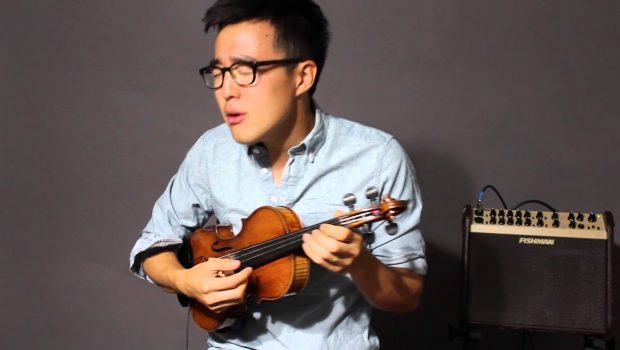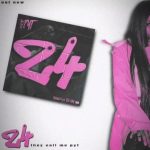Joe Kye Offers a Whimsical and Biting Critique of Child-Detention Policy at the U.S. Border With “Stick On Me” Music Video
“Like many other young people who grew up as an immigrant and as a person of color in America, I’ve had many experiences, some more blatant than others, that suggested I didn’t belong here, that I should leave. There’s no greater symbol of this sentiment than the current policy of separating families and incarcerating immigrant children at our border.”
Despite such blatant existential opposition, Korean-born, Seattle-raised Joe Kye, a violinist, loop-master composer, and vocalist has always insisted on an artistic mission of creating a sound and a vision that asks: how can we reach across boundaries and borders and work towards a more universal definition of humanity? And how can we choose to see the best in one another, whoever that other might be?
That vision, with all its fractures, fragments, wounds and gaps, resonated with a bittersweet optimism and a measured hope for change on Kye’s debut full-length album Migrants in 2018. Now, Kye combines that same positive self-reflective energy with a wonderfully whimsical visual aesthetic to address the very serious topic of family separation and child detention at the U.S. southern border on his brand-new video for the album’s lead single “Stick On Me”.
Produced in collaboration with Bay-Area director, writer, and justice-oriented activist Josh Young, and filmed in a recently defunct youth correctional facility, the video depicts a small group of children representing diverse ethnic and gender identities who unite forces to break Kye out of a prison cell. The narrative unfolds against the backdrop of Kye’s crisp playing, layered in swirls of pizzicato arpeggios and percussive elements, which form the foundation for his clever and reflexive lyrics and a tender, urgent voice.
“We chose children for this who I think make up an interesting representation of America, each with their own unique skillset and differences that allow them to contribute individually to a common goal. The video reads like a short film; it has a Wes Anderson aesthetic without Wes Anderson casting,” quips Kye.
The idea of a group of kids breaking into a prison, taking out the guards, and releasing the music, releasing the song symbolized by Kye jamming in the jail cell, makes for poignant commentary. As a result, it is impossible to watch the video and not root for the kids while at the same time, being compelled to think about the fact that there are children right now standing in detention cells.
“We have to confront this truth,” says Kye, “that we are incarcerating children and separating families who, just like the monarch butterfly or the humpback whale, are migrating …migrating for the purpose of sustenance and for life. And on our southern border, we are choosing to artificially stop that migration, to break up the family unit, and then to jail children.”
Kye wrote ‘Stick on Me” shortly after Trump was elected. With the wave of intolerance towards immigrants, people of color, and marginalized people a palpable force throughout the country, writing the song was a means to empower himself so that he could engage the country again.
The chorus “Stick on me and go lick your wounds and we’ll grow together” is an acknowledgment of the fact that Trump voters are people too, that the rural white middle of the country has their own suffering, as well as their worldview, says Kye. “And that affects how they move about the world, and their feelings that the world they should be living in does not include me. So the song itself is first about self-empowerment and healing from the wounds or scars and the triggers that I may have. And then from there, determining how I can reach out across the aisle, while also recognizing the limits of such interactions.”
Kye’s awareness of his own journey and its inherent tensions intersects with this impetus for social self-reflection, in imagined dialog on “Stick On Me,” when reverb-drenched lines create ear-candy timbres. “We all have our personal struggles. In spite of that, we need to rise to the challenge and give of ourselves even in our feelings of weakness. You have to let it come from within, an internal fire that blazes. Once we do that, we can then grow together and rekindle.”
In reaching across the ideological aisle, Kye points out that one would think it ludicrous that a major point of contention could be around the humane treatment of children. Filming the video at an abandoned youth correctional facility really brought home the depressing fact that the majority of children in America’s youth correctional system are foster kids, kids who never had parents around them to show them how to live life happily and productively. If anything, he hopes this song and video will serve as a serious, if light-hearted wake-up call to help people realize that a governmental policy of tearing children away from families is a cruel absurdity beyond imagining.
Kye’s family moved from Korea to the U.S. when he was six, and they struggled with the economic and cultural challenges immigrants often face. He remembers the cold winters when they couldn’t afford to use the heater in their house. They would snuggle under a sleeping bag on the couch and watch TV together or play video cassettes of Korean sitcoms they would rent from the local Korean grocery. Kye would fall asleep on his mother’s lap while his dad would cook up food with the limited resources the family had, and in many ways, they were truly happy.
“My point is, I had my parents,” asserts Kye. “I had my family and that access to family is so huge, especially in times of hardship. It is so imperative for basic humanity. So when I think of these kids with whom I feel a connection to, having also immigrated to a foreign country at a young age, the fact that these kids don’t have access to their families is devastating. And it’s also extremely angering.”
Tweet






























